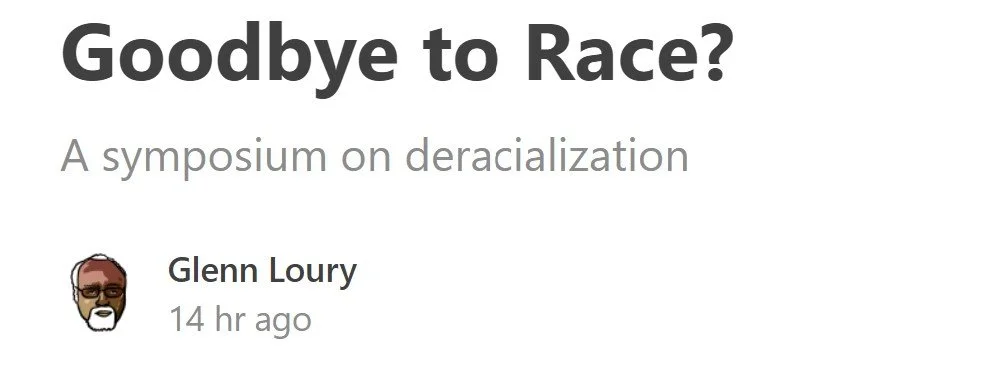Glenn Loury Challenged Me, Again. I Accepted, in Writing
Two weeks ago, I wrote about my latest appearance on Glenn Loury’s podcast. To my surprise, shortly after that appearance, Prof. Loury sent me the following note:
Dear Greg,
Below please find a lightly edited excerpt from the preface to the 2nd edition of The Anatomy of Racial Inequality, my book that Harvard University Press published last year. (The 1st edition was based on my 2000 DuBois Lectures and appeared in 2002.) I commend it to your attention considering our recent exchange at my podcast in the hope that you will be motivated to respond to the arguments on offer. I defend the use of the concept of “race,” which I define as “embodied social signification.” As well, I reject as fallacious your “ontological refutation” of the idea of “race” (i.e., the argument that “since there is no such thing as a ‘race,’ it is illogical to think of oneself as being ‘raced.’”) I look forward to your response.
Best wishes,
Glenn
Game on!
But not only did I have to contend with a tenured Ivy League professor, who actually was the first tenured Black American Professor of Economics at Harvard during the early 1980s, when I was just a college student, I also faced the gentleman who I publicly called out in my “Deracialization Now” essay, Clifton Roscoe.
One of my primary goals in advocating for deracialization is to confront and counter the conceptual underpinnings of racism by challenging the very idea of race, the process that creates and perpetuates it (racialization), and the mindset and racial worldview that socializes us into habitually accepting this nonsense and absurdity. Clifton Roscoe counters that since race is here to stay, like certain viruses we must live with, the better focus is on the social and economic problems, gaps, and misguided narratives that keep too many of our social group at a disadvantage. Here’s how I began my response to Mr. Roscoe’s arguments—which I’ll admit that he backed up with charts and graphs and strong reasoning:
Seems that we are comparing apples and oranges, Clifton. I’m emphasizing a vision of an American future in which race, racialization, and racism, all driven by a superordinate racial worldview, do not hold the same chokehold on our minds and behavior as they have since the eighteenth century. Your focus is on the statistical gaps between racialized black folk and other ethnic and racialized groups in contemporary America in academic achievement, income, employment, wealth, life expectancy, poverty rates, incarceration rates, criminal victimization, and so on.
I don’t deny that the problems and predicaments you point to are real and crucial to address. They are the downstream effects of a range of factors—systemic to familial to the individual—in which maladaptive choices and behavior predominate far too often. You shot down my mention of a few instances of positive markers among Afro-Americans. Perhaps you’ll also downplay as no big deal the rising middle-class and the higher post-secondary education rates among US Black Americans post-Jim Crow. So be it. I’ll defer to your prowess with statistics and graphs.
I won’t defer, however, in the arena of vision, which informs strategies and tactics . . .
I invite you to read the entire exchange at Glenn’s Substack, which as you can see above he framed as a “Symposium on Deracialization.” Here’s how Glenn introduces the exchange there:
The question of how or if America can move beyond racial categorization has become a hot topic here at The Glenn Show. Over the last year, several guests, including John McWhorter, have weighed in. One of the most ardent supporters of deracialization that I’ve spoken to is Greg Thomas, CEO and co-founder of the Jazz Leadership Project and a Senior Fellow at the Institute for Cultural Evolution. Greg’s essay, “Deracialization Now,” began as a response to both me and my frequent correspondent Clifton Roscoe. Clifton and I have each, in our own ways, voiced some skepticism about the feasibility of doing away with racial categories, at least in the near term. Greg, however, argues that deracialization is possible, and sooner rather than later. Indeed, he thinks deracialization is imperative.
I invited Clifton to respond to Greg, and that kicked off a correspondence between them on the subject (I got the ball rolling with an excerpt from the new preface to The Anatomy of Racial Inequality). You’ll find that correspondence [here]. I’ll withhold further comment on the matter here, as I think both Greg and Clifton argue their respective sides of the argument rigorously and forcefully. Let’s keep the conversation going—I’m looking forward to reading your comments.
I agree with Glenn: let’s keep the conversation going. Please share your comments and thoughts below.

